Times have changed and the once unimaginable dream of working from the comfort of our home is now considered the norm for many people. This old dream has been replaced by the realisation that if it’s possible to work from the spare room, and that maybe it’s just possible that we can work from the taverna, the beach, the railway station, the airport departure lounge or even the local igloo. Okay, maybe not the igloo, not just yet. But you get the idea.
We have invented a whole new vocabulary to use whilst zooming from the sofa or skyping from the sun lounger. One of these new phrases is “work from anywhere”.
But as we all pack our laptops into our carry-on luggage to head off into the big wide world of remote working, we create a problem. Where to stay!
With post-COVID tourism figures soaring, the demand for short-term accommodation pushes the price up exponentially. So, it becomes less financially viable for us to head off to sunny climes to fulfil the new dream of the sunny hammock by the sea remote working. Even good old Airbnb prices are becoming over the top in many locations.
Affiliate Link Disclosure: This post contains affiliate links. If you use them to make a purchase, we may earn a small commission at no extra cost to you. As an Amazon Associate, we earn from qualifying purchases. Learn more in our Affiliate Link Disclosure.
Enter Noad Exchange
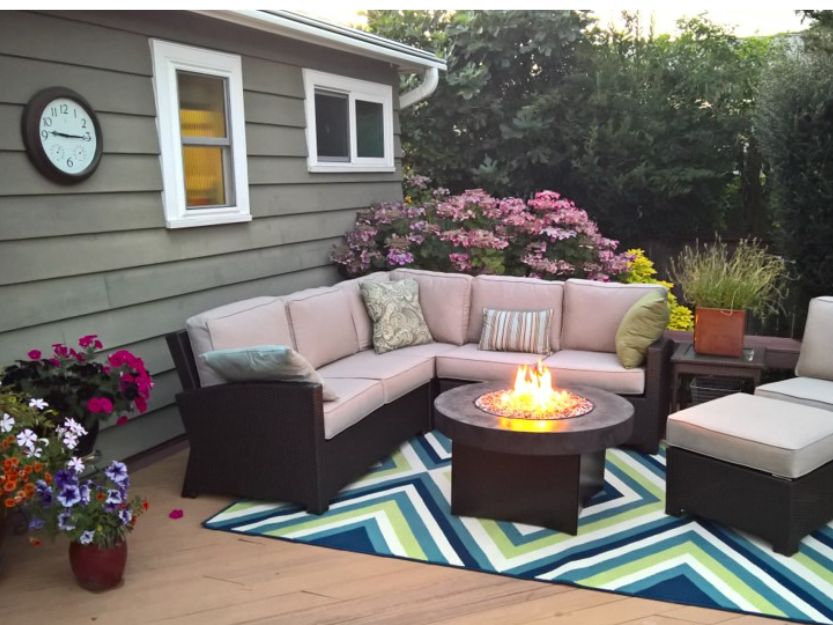
Enter Noad Exchange, a membership-based home exchange network designed for remote workers and digital nomads with a home base. Noad Exchange provides an affordable, flexible housing solution that makes it easier to travel and explore the world whilst still holding down a lucrative career.
In this post, we’ve partnered with Noad Exchange to explore the world of “working from anywhere,” diving into the requirements for successful remote working, and conquering the Noad Exchange ideas which can help you work from anywhere.
Note: You may prefer to skip to the bit where we tell you all about Noad Exchange, how it works and how you can sign up
OR you may even like to just jump straight in and become a Noad Exchange member, using our referral code CanWillTravel to get three extra starting credits for your first three nights of stays.
What is “Work from Anywhere”?

Work from Anywhere (WFA) is the exhilarating concept that’s redefining the way we live and work in the digital age. Imagine waking up to the soothing sound of ocean waves, sipping coffee at a charming European cafe, or even taking in the breathtaking vistas of a mountain retreat, all while keeping your professional life in full swing. That’s the essence of Work from Anywhere.
In this liberating workstyle, your office isn’t confined to a stuffy cubicle or a concrete jungle. Instead, it’s wherever your wanderlust takes you. With a laptop and a reliable internet connection, you have the power to turn almost any corner of the world into your workspace.
Work from Anywhere isn’t just about remote work; it’s a lifestyle that empowers you to explore new horizons, immerse yourself in diverse cultures, and chase adventures while still maintaining a fulfilling career. It’s the ultimate fusion of work and wanderlust, allowing you to blend your professional aspirations with a boundless sense of adventure.
Who Does the “Work from Anywhere” Thing?
It’s no longer that annoying show-off you used to meet on holiday who does the “Work from Anywhere” thing. You know, the plonker sitting at the pool bar with a laptop bragging about their latest sales success. I remember the first person Andy and I met like this, years ago. He was designing his latest Facebook sales campaign while sitting at a bar after a day snorkelling in Puerto Morelos in Mexico. I took an instant dislike to him. Purely because I was jealous of the fact, he could earn great money whilst doing what I was paying great money to do.
Things have changed. Now it is common for people to work remotely from home and people are now beginning to bend the rules a little and work from the beach, the café, and the hotel.
Nowadays, “Work from anywhere” can be suitable for a wide range of people and professions, but it may be particularly well-suited for individuals who possess certain characteristics and job roles. These include Knowledge Workers, Freelancers and Remote Contractors, Digital Nomads, Sales and Marketing Professionals, Consultants and Advisors, Customer Support and Service Representatives, Creative Professionals, Project Managers, Research and Analyst Roles, and IT and Tech Professionals. The list is almost endless.
The Shift Towards Working from Anywhere
But you know the shift towards working from anywhere didn’t happen overnight, or even over COVID like many people think. The origins of Work from Anywhere are rooted in the early 1970’s.
Telesales
As far back as 1970 small teams of NASA staff were given the task of exploring the possibility of working from home. It had mixed success doughnuts were a distraction! But bring on the increase in people with their phone in the home and suddenly the telesales call centre became a thing. It was only a small logical step to cut the cost of the centres by having people working from home.
Internet
We all know the impact the internet had on our lives. But it also created whole new industries. Many of these included work that only required a computer and an internet connection. This started the breed of perpetual lone remote workers, predominantly freelancers in the IT trades who worked via email from the spare room.
Skype
Video calling stopped being a Star Trekkian dream and became a reality as soon as broadband prevailed. This enabled video conferencing to happen in real time with little delay or lag and with reasonable picture quality. Connecting remote branch offices with the board meeting at HQ evolved into connecting the CEO’s home office with the board room and gave them the chance to kick back at home whilst everyone else cracked on with the work.
COVID
Changed everything. Faced with no other option, companies packed up the offices into peoples’ cars and sent their workers off to the comfort of their living rooms, cupboards under the stairs, disused granny annexe or the empty space in the garage. Offices emptied, city centre sandwich bars went bust and people discovered that the 8.30 a.m. meeting could be done from bed with the camera off (always triple-check that!).
Post COVID
And people didn’t want to go back to the office. Sometimes there wasn’t an office to go back to. Companies realised that production didn’t drop too much and, in some cases, actually improved. The need for those city centre offices with high ground rent and business rates just wasn’t there anymore. Financially it was better to pay the workers a little extra for internet and heating and keep them at home. Workers liked the lay-in. No more horrendous hour-long commutes on packed subways or sitting in traffic jams. The computer off at 5 pm, the TV on by 5.01 pm, and a glass of wine in hand by 5.05 pm. Perfect.
4-Day Work Week
This is not a new thing either, it has been kicked around the HR department since the mid 90’s. But in recent years more and more companies have been experimenting with a four-day work week. Even our old friend Simon in the nuclear power industry now works a four-day week on a rota.
Great Resignation
So, people saw these lucky ones working from home and thought “Hang on a minute! Why am I not doing that as well?.” And then they began to question the whole work ethic thing and realised there was more to life than a nine-to-five in an office. So, they quit and got a nice work-from-home job.
So, Where Are We Now?
The last four years have forced employers’ hands when it comes to remote working. What was becoming a slow, almost glacial paradigm shift in working was turbocharged into a tidal wave of disruption that sent people flocking home to never (okay sometimes begrudgingly) return to the office again. Sure, COVID was the catalyst for the change but the change did not stop once the lockdowns had ended. Quite the opposite, stats show that the number of remote workers has grown by over 33% year on year since 2020 and continues to grow at this pace.
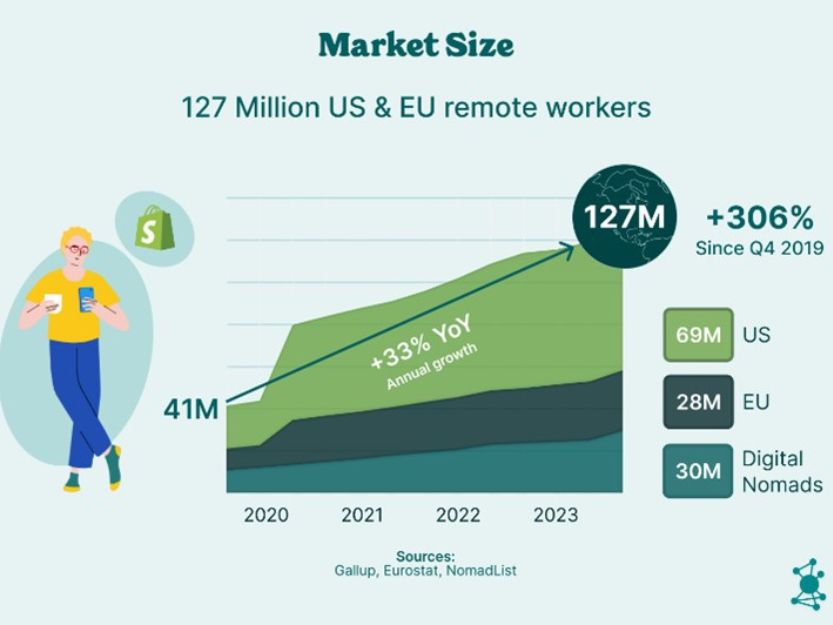
And Where Are We Going With This?
There are pros and cons to remote working for both the employer and the employee. It’s great to have no commute and work in your pyjamas until the “Teams” call at 1 pm. Just as it is great for the company to shed expensive office space and utility bills. But sometimes the loneliness of remote working can be a bit much in the same way that the staff team starts to feel fragmented and socially disconnected from each other.
Saying that however, in most cases the pros outweigh the cons and both employers and employees still like the idea of remote working. People’s perceptions of life have also changed, and wellbeing, wellness, work-life balance, and quality of life are now all subject of heated debate both in the board room and in the canteen. Stats tend to suggest that remote working is here to stay and is going to take over.
Hybrid Theory
So, we see the panorama of the working environment changing. New positions might include mention of working from home. It is certainly an acceptable discussion point in a job interview now. Some companies offer part-time or even full-time remote work as part of the deal. A few go even further, like Spotify, which positively encourages some workers to work from abroad for up to three months of the year!
The Word of The Moment is “Workation”
That’s right! Take a workation or bleisure trip. That’s right, with workations and bleisure trips you can have a holiday but take some work with you!
Heading to your cousin’s wedding in Italy? Don’t stay for just the weekend, stay for longer, work a little, and then take in the sights of Rome! Got a meeting with a client in Dubai? Why not make a week of it, go shopping and finish that work from the beach bar? You could make a fortnight of it and go directly to Frankfurt to close the latest deal.
“We’ll pay for the flights of course but we’ll need you to cover the accommodation costs….”
And There Lies the Problem With Working From Anywhere
So, you are scanning booking[.]com for a reasonably priced hotel but they all seem fully booked. It’s okay, actually, an Airbnb-type place would be fine. Oh, it looks like they are also all full or horrendously overpriced. And finding somewhere in the city centre for two weeks straight is proving almost impossible.
The post-COVID desire to get away mixed with the mad rush to take advantage of flexible working has led to an increase in everything in the tourist and travel sector. Prices of everything from hire cars to hotel rooms, flights to ferries, daiquiris to desserts have all shot up. Suddenly that workcation is looking less and less financially viable. So, you opt for the place a little out of town, you know, the more “value for money” option. It’ll be fine. Honest.
Checking in then actually proved a bit difficult, you had to get a taxi across the city at 1 am to find the keyholder. It’s nice the owner left the key with his auntie. Such a shame he didn’t tell her you were coming. More of a shame about Aunty’s big guard dog. Luckily, you had your laptop bag to defend yourself with.
And so, the story starts. It’s an epic tale of missed conference calls and lost data due to the terrible intermittent “wi-fi” (sure it’s not dial-up? Pigeon post would have been more dependable). The chiropractor was nice to point out that 9 hours in a hammock with a laptop is probably the cause of the kink in your neck. Shame there wasn’t a desk in the place. But that’s okay because you managed to balance the laptop on the other bar stool and use the telephone stand for the mouse mat. The laptop only fell off a few times. And slowly what started as a dream workcation became a humungous workmare.
The Difference Between a Holiday Let and a Work from Anywhere Space
Until a few years ago it was considered an outlandish crazy idea that anyone would want to bring their work with them on holiday. So, all those quaint little Airbnbs had no reason to provide a decent office area, particularly when you could put a sofa bed in that space and raise the price. Sure, hotels generally include some kind of table or desk in the room, but they are usually an afterthought and now are used for the micro espresso machine, kettle, and selection of fine teas.
During our time travelling in Mexico and Central America, we found more and more time was spent requesting internet speed test results from accommodation providers. Even then, many times we checked in only to find the internet connection unusable for reliable video conferencing. A bit of a problem when you teach English online via Skype! Once we found somewhere we were reluctant to move location for fear of the next place having terrible Wi-Fi connections.
What is needed is reasonably priced good quality accommodation that includes all the necessities and comfort of a home office. As a minimum, a good desk, comfortable chair, good lighting, decent backdrop for video calls and above all, great reliable fast Wi-Fi.
This experience has been shared the world over with the now millions of people who have started to work remotely. It frustrated three guys (Austin, Jonah, and Tom) so much that they clubbed together to start a new platform aimed at solving these issues.
“After 5 years travelling as full-time remote workers, we have intimately experienced the problem: existing housing solutions fail to solve for remote work, affordability, flexibility, or stays longer than one week.”

What is “Noad Exchange”?
The idea is simple yet brilliant. You can stay in a fellow Noad member’s house for free as long as you let someone else stay in yours when you are away.
You earn credits by letting another Noad member stay in your place. You spend credits by staying in someone else’s place.
It’s free apart from paying a few bucks for a cleaner to tidy up after you leave so the place is clean and tidy when the owner returns. A typical cost saving is shown in the infographic below.
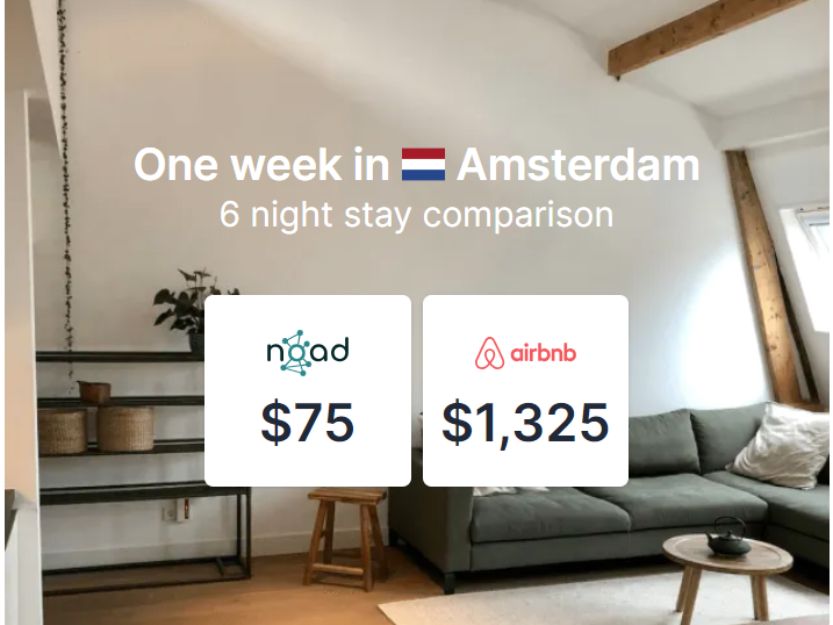
We all love visuals so here’s another one to help explain in more detail how Noad Exchange works:
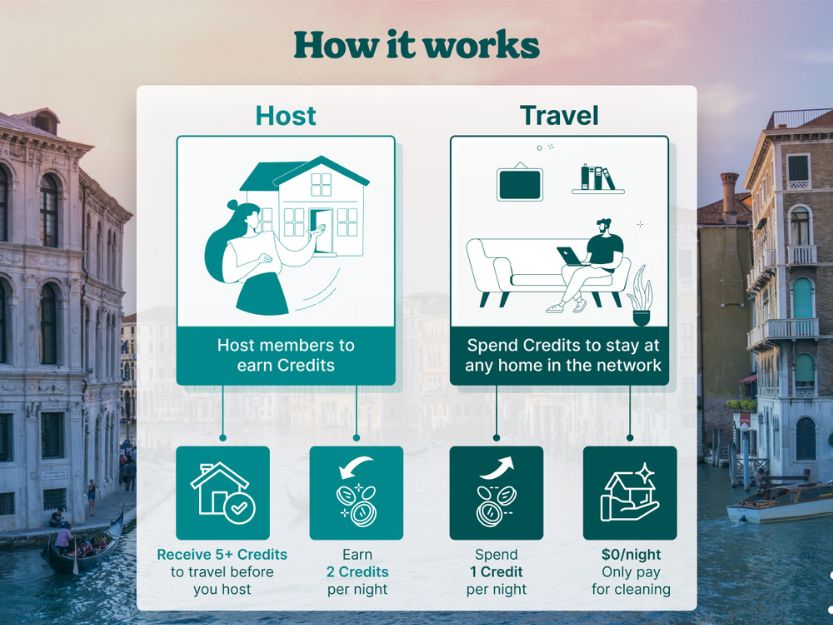
How Does Noad Exchange Differ from Airbnb
Here are the many ways that Noad Exchange differs from Airbnb, which makes it better for remote workers and digital nomads:
You Are Not Renting a Place to Stay
Because Noad Exchange is an exchange platform using a credit system. No money is exchanged between members, so you are not renting a place to stay.
To participate in the scheme, you pay an annual membership. This is often less than a one or two-night fee for staying in a hotel or guesthouse. After that, you pay just the predetermined cleaning fee.
Great Wi-Fi and Work Area
Each place is checked for great Wi-Fi and a decent work area ensuring you can work with ease in comfort.
You Can Join Even if You Rent or Lease Your Home
Even if you rent or lease your home you can still become a Noad Exchange member. Because no money is changing hands you are not sub-letting your property. You become a host. Just like when your friends stay.
Every House is Lived In
As every house on Noad Exchange is lived in, it stops the ethical dilemma of the holiday home syndrome.
This is when communities are ruined by people from out of town buying homes for holiday lets. This pushes prices up for local people and leaves the property empty for most of the year.
The local community suffers from high property prices driving out young families, the local community revenue drops, schools, and shops close and the place becomes a ghost town.
Every House is Loved and Worked In
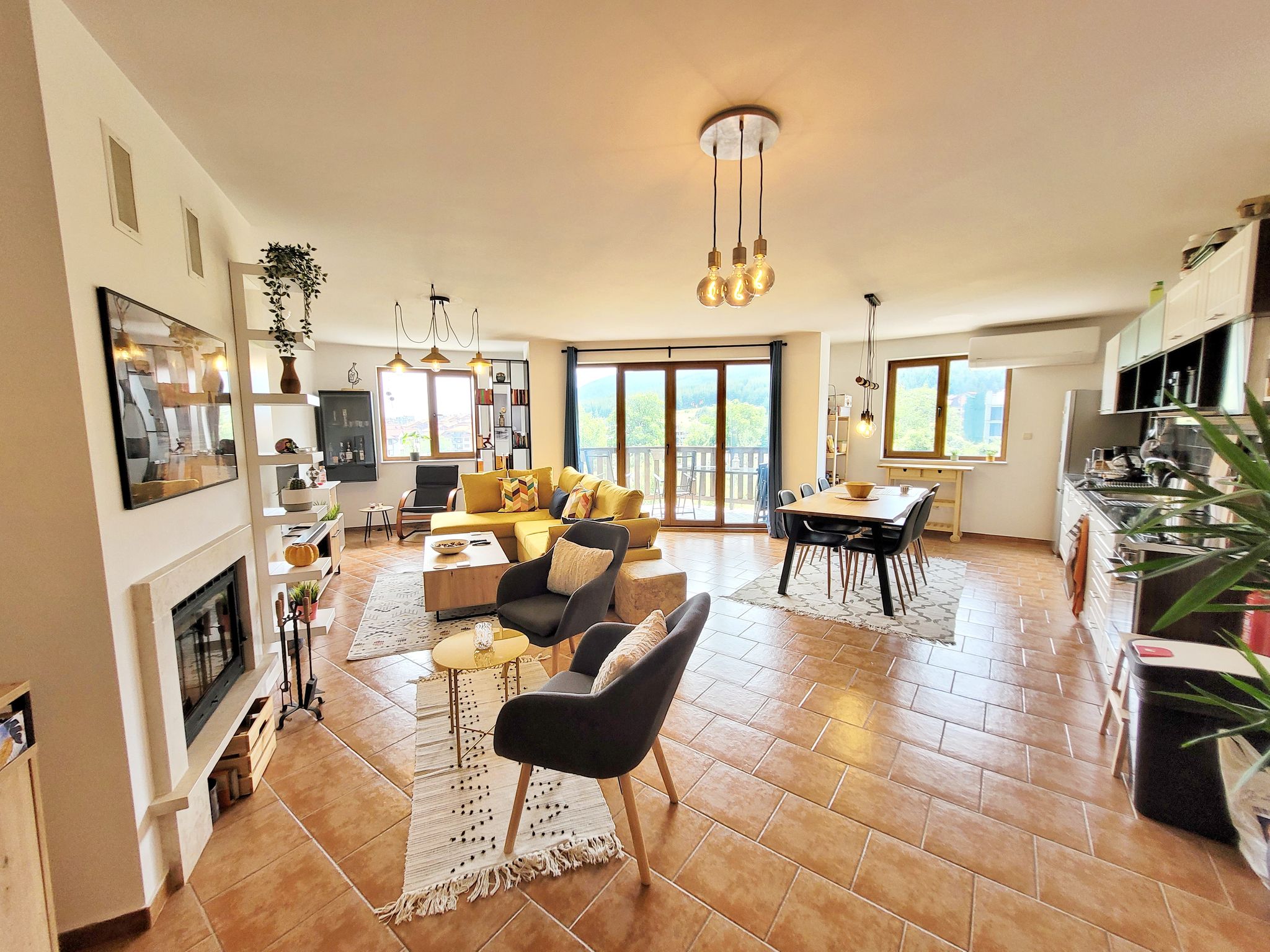
As every home on Noad Exchange is loved and worked in, it means you get to stay in a house equipped for remote working. You experience a fellow remote worker’s daily life living in their home community.
It’s real life, not the tinsel town of the seafront holiday home. It’s also not the empty shell of the bare minimum equipped holiday rental. It’s a home-from-home.
The Host and Guest Meet in Advance
Before your stay or before you host, you both meet on a video call to get to know and vet each other. You have complete control over where you stay and who stays in your home.
No nasty surprises, rogue landlords, vicious aunties, or run-down gangland squats.
Staying is Free
After paying the membership and cleaning bill you pay nothing to stay in a Noad Exchange home. That must make it the cheapest option out there.
You also get the security option of having someone mind your place when you go away next.
The Future of Noad Exchange
Noad Exchange is in its infancy at the moment, but the staff team is strong, experienced, and dedicated. The concept is logical and sound. It’s created by remote workers for remote workers. I have the feeling it’s going to be huge in the future.
To find out more, you can check out the Noad Exchange website. Or become a Noad Exchange member straight away by clicking the button below.
Be sure to use our referral code CanWillTravel when you sign up as a member to get three extra starting credits. That’s three nights in a home of your choice. It could be the start of something beautiful.
Read More Live and Work Abroad8 Reasons to Use SafetyWing Travel InsuranceDigital Nomad Guide to Siem Reap in Cambodia Long-Term Travel Insurance – True Traveller and World Nomads |
Enjoy this post? Pin it for later!
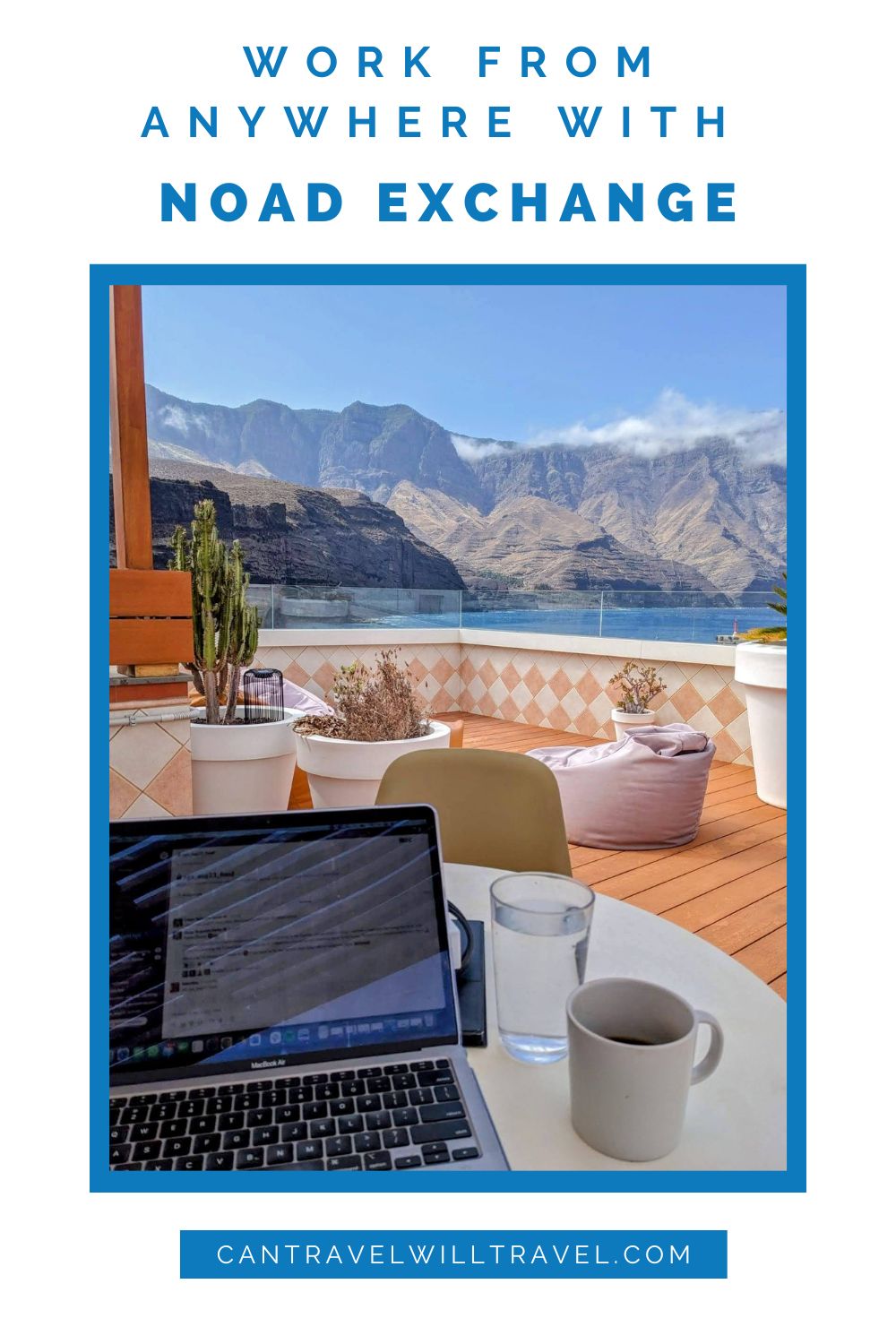 | 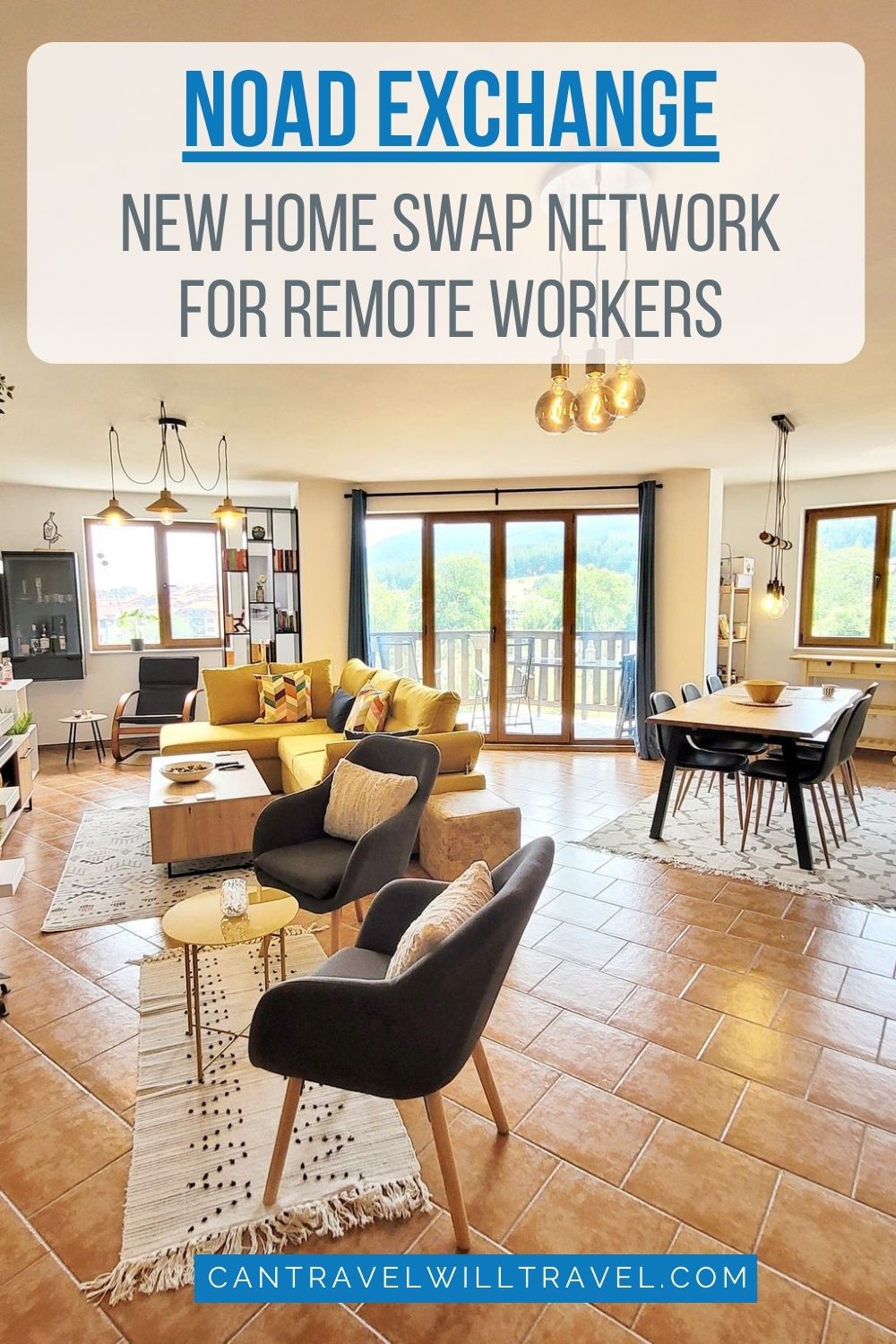 |
Sponsored Post Disclosure: This post has been created as a paid partnership with Noad Exchange. Read more in our full Sponsored Post Disclosure.
